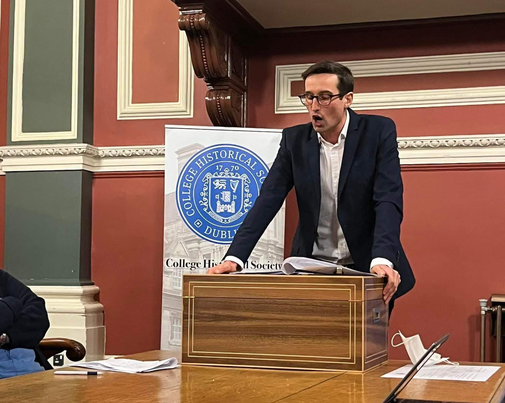
One hundred years ago this week in 1921 the Anglo-Irish Treaty was signed. It was a turning point for Irish freedom. But was it for the better?
Last night’s College Historical Society (the Hist) Chamber debate in collaboration with DU History confirmed that this question continues to burn in the heart of this nation. Master orator Dr Patrick Geoghegan of Trinity’s history department chaired the debate, which also saw two esteemed guest speakers rouse the crowd: Dr Mary McAuliffe for the proposition and Dr Conor Mulvagh for the opposition.
There was consensus among the speakers on both sides that the movement away from British domination on the island of Ireland was and is desirable. On that basis, considering the enormous gains in independence brought about by the Treaty, it seems obvious that it should not be regretted. McAuliffe quoted extensively from the Dáil speeches given by the women rebels in the debates over the treaty. For them, it was clear that the Treaty did not provide a pathway to freedom, it was “slavery, worse now because willing”. Freedom had a modified meaning for the women of Ireland, who were so instrumental to the Revolution and the War of Independence, and who feared a denial of their equality under the agreement offered by the British.
The opposition agreed that the terms of the Treaty were “unpleasant” (Mulvagh) and “not enough” (Darragh Matthews), but ultimately was it really our British oppressors that dictated the terms of our freedom? “Democracy under duress” was a phrase thrown around a lot by the proposition, and perhaps it was – it was repeatedly brought up that the alternative suggested by the British to the Treaty was “immediate and terrible war”. But Geoghegan reminded us that the Treaty was debated in and accepted by the democratically elected Dáil, who were free to decide otherwise.
Aisling Rooney of the opposition eloquently pointed out that we’re asking ourselves the wrong questions. An obsession with treaty politics rather than the contents of the treaty is what curtailed and curtails our political freedom today. This has led to a severe lack of national catharsis as we continue to dig up painful memories about what are essentially trivial details of our history. This point was massively bolstered by the final address by Geoghegan, who railed against the proposition side for bemoaning the imperfections of the treaty rather than facing up to our own responsibility for the atrocities of modern Ireland, particularly abuses carried out in religious institutions. There was much discussion by the proposition side about the “shallow process of Hibernification” in the Free State period, but the shallowness can, by now, only be seen as our own doing.
The evening ended with a firm victory for the opposition side, with three speakers from the audience doing impromptu floor speeches arguing in their favour, as well as the powerful speech made by self-proclaimed “time-lord” Geoghegan. However, it was impossible to leave the Chamber without a severe feeling of dissatisfaction. The outcome was less of a victory for the opposition as a defeat for the proposition. The only unquestionable outcome of the debate was a complete loss of faith in the value of such a debate in the first place.






